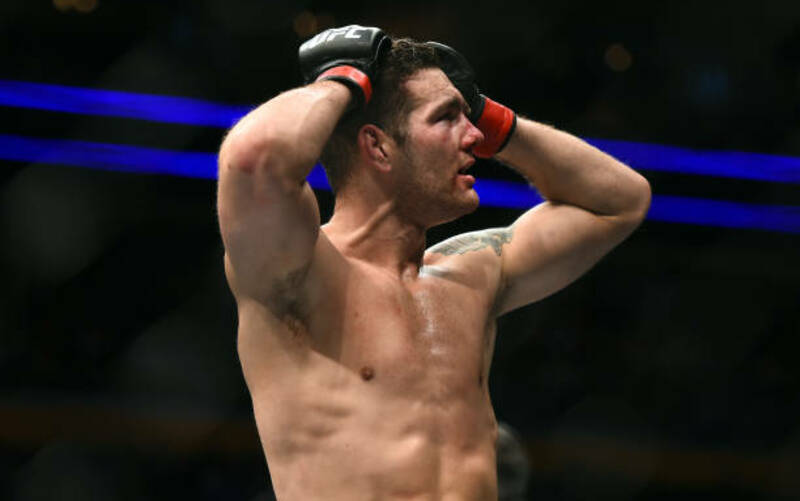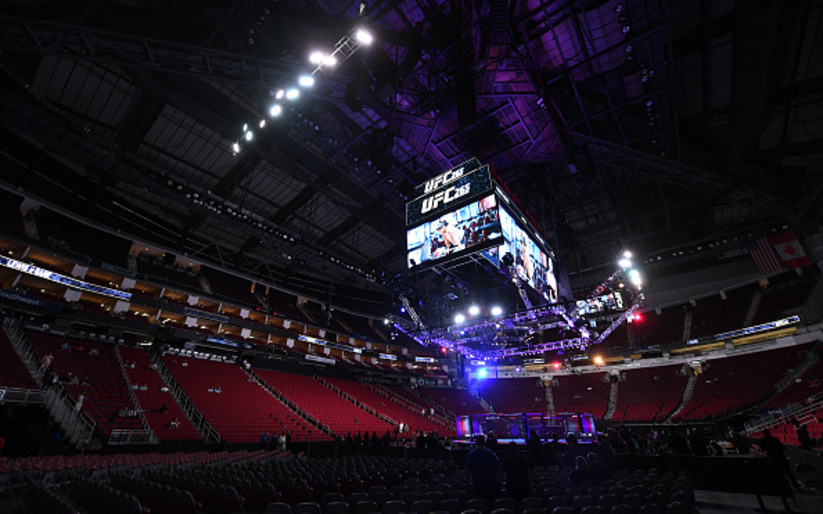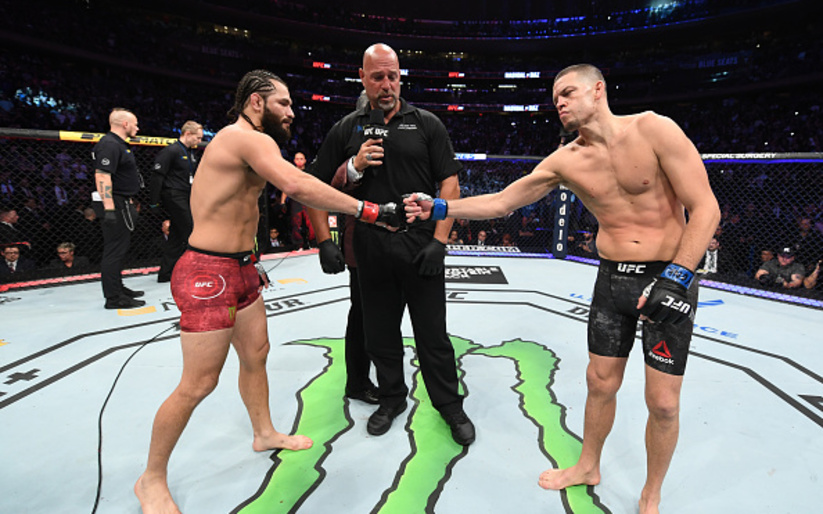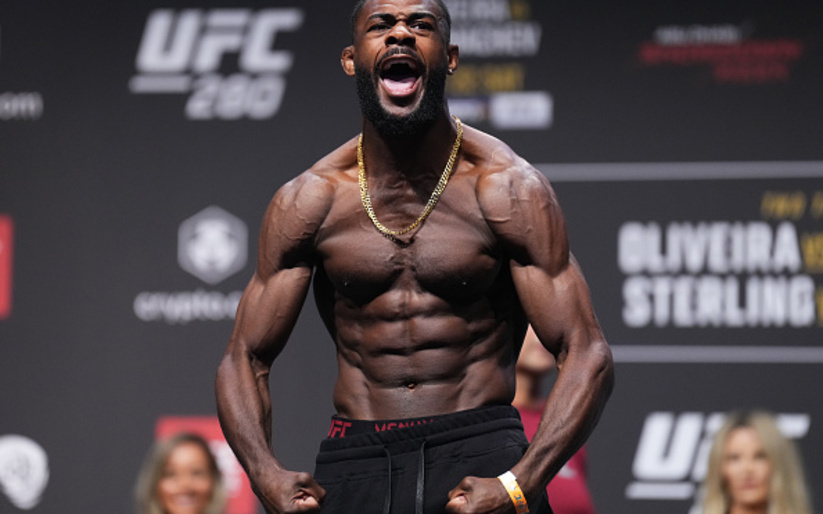18 months prior to Chris Weidman’s iconic championship win over Anderson Silva, he was but a young, inexperienced upstart with a 7-0 record – fresh off of a Facebook-streamed submission win over Tom Lawlor. 18 months removed from UFC 194 – where Chris Weidman eventually lost his championship after a glittering run as champion – and the New York-native is riding a three-fight losing streak and finds himself at a career crossroads, with it all to prove once more.
While Weidman’s journey to UFC 162 and his emphatic knockout of Anderson Silva was made to the soundtrack of hard-work, grit and overcoming adversity, Weidman’s championship reign was forged with dominance and an air of destiny. Weidman breezed through the UFC’s Middleweight elite whilst defending his throne and made it look easy in the process, with legendary Brazilian’s Lyoto Machida and Vitor Belfort falling in his wake in addition to the rematch victory over Anderson Silva. Heading into UFC 194 as a -155 betting favourite, the stars had aligned for another step closer to Chris Weidman cementing himself as the pound-for-pound best inside of the cage. Outside of the cage was just as rosy, with Weidman enjoying life as a married, father-of-three and leading the crusade for eventual legalization of MMA in his home-state. What followed in Las Vegas was a sharp, abrupt and violent plot-twist, courtesy of Luke Rockhold, and marked the beginning of a sharp decline in fortunes for Weidman.
Whether it was complacency or simply natural selection taking its course, it remained a bone of contention for many months after the fight. Some felt that the Chris Weidman that showed up on fight night on December 12, 2015 and gave up his throne was not “The All American” that they had been accustomed to seeing. An injury history dating back to his teenage years is acknowledged, but hardly explained a lop-sided and out-of-character defeat. Regardless of the how and the why, Weidman remained among the elite and within touching distance of a rematch. So close, in fact, that at UFC 199 he was due to get his wish of an instant rematch with Luke Rockhold. The contracts were signed and the promotion in full swing. The score would be settled once and for all. Was it a fluke, or was it just Luke? At UFC 199 in Inglewood, California we were due to find out. Just two weeks from fight night, however, Weidman was forced to pull out by family and friends with a rehabilitating neck injury which required surgery. The comeback would have to wait a little longer. In a bizarre twist of fate, Weidman was replaced by long-time staple, but first-time contender, Michael Bisping, who went on to seize his moment and capture the championship. The win was more than just tinged by question-marks, as it emerged that Rockhold had fought with a severe knee injury of his own, leading to a surprise defeat. An unfortunate and ironic turn of events, and one from which the Middleweight division has not recovered any real semblance of order even to this day.
Desiring nothing short of a route back to the title, regardless of who was wearing the belt, Weidman healed up and accepted a fight with the surging Yoel Romero, fresh from a title elimination win over fellow titan Jacare Souza. The fight was billed as a number one contender clash, with the winner set up nicely for a championship bout, and would take place in New York at UFC 205 – Weidman’s home-state – at perhaps the most iconic venue in sports, Madison Square Garden. It was logical match-making from UFC’s point of view. #1 vs #2 contender. A true and honest way to find the next in line for the belt. That line of logic is hard to argue with, but pairing a former champion fresh off of a painful loss with a man who already had enough momentum to warrant a title shot seemed to ignore the potential ramifications of a Weidman loss. For a man who had been paired with Ronda Rousey and Conor McGregor in his recent headlining acts, indicating that UFC was investing heavily in Weidman’s star, it wasn’t the most generous match-up that they could have given him. The reward from a match-making perspective was a bonafide number one contender, the risk was cannibalizing the division and losing another.
On fight night the Chris Weidman of old showed up. Stifling the explosive and unpredictable Yoel Romero for two rounds, Weidman was on his way to earning a decision victory not dissimilar to that of the one he earned vs Lyoto Machida. Dominating the and minimizing the space inside the cage and always ensuring that he was the one pressing forward, it was a signature Weidman performance in many ways. It wasn’t emphatic or even pretty, but instead a nod to the grit displayed on his run towards the big-time. The hunger was evident and the local man was following his strategic game-plan to a tee. A mere 24 seconds into the fights final stanza, and everything changed. Yoel Romero’s unpredictability reared its head and clattered Weidman’s with a flying knee. The fight was over. Did Weidman get complacent, or did the better man win? The same questions that were asked at UFC 194 were being asked once again. The script for Weidman’s triumphant return to New York was turned on its head – Romero was the victor, and Weidman was again left in a pool of blood wondering where it all went wrong.
The feared, omnipotent Chris Weidman was humanized once more and instead of heart-felt congratulations and gleeful “attaboys” reigning in from his fellow New Yorker’s in the crowd it was exclusively painful sympathy and awkward condolences coming his way. Weidman did not account for the possibility of losing at UFC 205 – the man with the “refuse to lose” moniker likely wouldn’t – but lose he did and for the second time in a row. Weidman’s plan of knocking off the top contender returning to the main stage in minimal time had backfired severely, and with it a losing-streak was born. Instead of executing a plan for damage-control and looking to retain Weidman’s status as a big-name and a player in what has traditionally been a shallow division, it is indisputable that UFC booked Weidman the toughest fight they possibly could have. Whether it was right or wrong, good or bad match-making is hugely debatable, and the very thought of protecting Weidman is likely enough to make him vomit in his mouth if he ever heard you say it, but it was questionable in this writers eyes at the very least.
Despite being on the wrong-end of a highlight reel knockout and being left with 10 stitches, Weidman’s post-fight medicals cleared him of suffering a concussion, paving the way for a relatively swift return to action. Weidman’s eagerness to rid his mouth of the losing taste would lead to a return six months later, and by no coincidence it was was booked for UFC’s return to New York as the co-main event. Weidman’s desire to return to the cage at the earliest opportunity could easily be construed as impatience, but underlined a confidence that there were no gaping holes in his game to be ironed out before he returned to the cage, instead that he merely needed to get a fight and pick up another win.
Though you would never see a contender coming off of a loss like Weidman paired up so sternly in boxing for their next fight, I can just about accept the description of Weidman vs Romero as being fair and rational match-making. The same cannot be said under any circumstances for Weidman’s next (and most recent) fight vs Gegard Mousasi. Instead, Weidman vs Mousasi – at that moment, under those circumstances, and all things considered – was homicidal match-making. Suicidal from Chris Weidman’s point of view, but it again underlined the confidence and bravado of Weidman, clearly unaffected by his prior two outings. Weidman’s self-belief is unlike any of his fighting peers and is perhaps his biggest asset. Despite Weidman’s undoubted confidence in his own abilities, it should have been the UFC’s match-makers making the decision to ease him back into the mix, rather than throw him back to the wolves. Unfortunately no such mercy was shown nor logic employed.
0-2 Weidman, stopped in each of his last two bouts and coming off of a crushing defeat in New York, was paired against a man who’s last venture into the cage was his 41st career win and marked his fourth in a row. UFC 210 was the event, the KeyBank Center in Buffalo, New York was the venue and the fight marked another drastic drop in Chris Weidman’s stock. Much like the Romero fight, Weidman looked good in patches. Weidman looked like a man worthy and capable of challenging again for his championship. A back and forth, balanced fight which under different circumstances would have been a deserving championship fight, looked to be in Chris Weidman’s hands – but then the officials failed him. Not only did they fail him – they robbed him. With Weidman motioning for a take-down amidst a frenzied stand-up flurry, Mousasi initiated a front headlock and swiftly made the former-champion pay with a knee to the head, followed by another in quick succession, the force of which would only be considered moderate, rather than concussive. By all accounts, both knees were widely considered legal. The legality of the knees that connected were not the issue because they were not fight-ending knees – or at least they shouldn’t have been. Dan Miragliotta’s decision to stop the fight momentarily under the assumption that one of the knees was illegal was logical, but what happened was perhaps the most illogical, inept display of officiating in recent memory, which served to overshadow UFC 210’s main-event and raise major questions over New York’s capability of hosting MMA events. The fight was over. Chris Weidman didn’t quit, Chris Weidman didn’t plan on quitting – and yet the fight was over. Though Miragliotta’s honest mistake was completely forgivable, the New York State Athletic Commision’s mistake was not. Citing a technicality, they stopped the fight and awarded “The Dream Catcher” a TKO victory. Chaos ensued. Fate is not one to be trifled with, and I cannot escape the feeling that the outcome of that fight was a stark reminder from the MMA gods that stupid match-making will never go unpunished. Had Weidman lost fair and square, he would have lost fairly to a fellow member of the Middleweight elite, but there was nothing fair about what happened in Buffalo.
If Weidman was inconsolable after UFC 205’s defeat in New York, Weidman’s demeanour was that of sheer rage this time around. Time will not have made the feeling of rage go away, nor will it overturn the loss that was bestowed upon him by his home-states athletic commission. The only thing that would help matters is a return to the cage, and a return to the win column. Here we go again.
There is a very strong chance that Chris Weidman will defeat Kelvin Gastelum when they meet at Nassau Veterans Memorial Coliseum in Uniondale, New York. He is the bigger man, the better wrestler and grappler, with far superior credentials inside of the cage. If we’re being optimists, we’ll consider that he’ll be main-eventing in front of his home crowd and that will give him more momentum – rather than pressure – on fight night. All of that duly noted, and yet standing before him will, once again, be a fierce, rabid Kelvin Gastelum. A younger, far more explosive fighter riding a knockout of Vitor Belfort, Gastelum is a tough fight for anybody in UFC’s Middleweight division. He may well even be a top five fighter, when you consider that the current belt holder is acknowledged by most as a fortunate rather than deserving champion. This may even be a championship caliber fight – it’s certainly a main-event worthy fight – but it should not be happening. By booking Weidman, on a three-fight losing streak, against Kelvin Gastelum, they are effectively writing off Weidman as a contender. If UFC were incompetent in their last two bookings, they are callous in this one. They are using Weidman’s name for ticket sales alone and not considering the delicate, precarious position that he finds himself in. The man who gave UFC the two most memorable Middleweight championship fights in company history vs Anderson Silva deserves a little leeway and to be eased back from the brink of career capitulation – conceding as much is not a knock on his skills, but instead sensible booking practice.
Feed Weidman a live Alex Nicholson. Match Weidman up with Chris Camozzi. Make the Tim Boetsch fight-that-never-was a reality. Dan Kelly would have been a willing, more sensible opponent. These are options that should have been in play directly after the Rockhold fight. Two further losses down the line and it shouldn’t even be a question.
Weidman’s caliber of opponent since becoming champion has not changed and he has exclusively fought the best and brightest in the UFC’s Middleweight division. His catalog of opponents stacks up there with the toughest runs in UFC history. In running the UFC’s gauntlet he has displayed heart, guts and a warrior spirit and has only enhanced his reputation as a “true fighter”, as well as a true “company guy”. However, it is that same heart, guts and warrior spirit – along with terrible UFC matchmaking – that has led him to this luckless position. Kelvin Gastelum is a man Weidman needs to defeat. A horrible split-decision. A lucky punch. A submission. A DQ. It doesn’t matter how it comes – Weidman cannot afford to move to 0-4 in his career, for that would mark the point of no return.
Chris Weidman, the dominant champion of two years ago, shouldn’t be in his position. Yet here he is – staring down the barrel of a gun held by the UFC match-makers. A win would relieve Weidman of the pressure, free him from his downward spiral and immediately restore him to the top five of the division – a loss would undoubtedly end his career as a championship contender.
Featured Image:




looks like your contact forms are all broken, all i see are shortcodes 😉